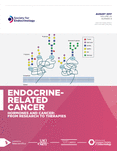Plasma membrane ion channels and epithelial to mesenchymal transition in cancer cells
- 1The School of Pharmacy, The University of Queensland, Brisbane, Queensland, Australia
- 2Mater Research Institute, The University of Queensland, Brisbane, Queensland, Australia
- 3Translational Research Institute, Brisbane, Queensland, Australia
- Correspondence should be addressed to G R Monteith; Email: gregm{at}uq.edu.au
Abstract
A variety of studies have suggested that epithelial to mesenchymal transition (EMT) may be important in the progression of cancer in patients through metastasis and/or therapeutic resistance. A number of pathways have been investigated in EMT in cancer cells. Recently, changes in plasma membrane ion channel expression as a consequence of EMT have been reported. Other studies have identified specific ion channels able to regulate aspects of EMT induction. The utility of plasma membrane ion channels as targets for pharmacological modulation make them attractive for therapeutic approaches to target EMT. In this review, we provide an overview of some of the key plasma membrane ion channel types and highlight some of the studies that are beginning to define changes in plasma membrane ion channels as a consequence of EMT and also their possible roles in EMT induction.
- Received 5 September 2016
- Accepted 12 September 2016
- Made available online as an Accepted Preprint 12 September 2016
- © 2016 Society for Endocrinology












